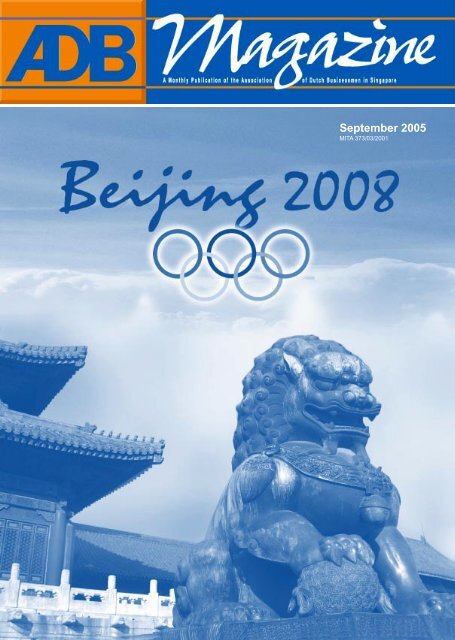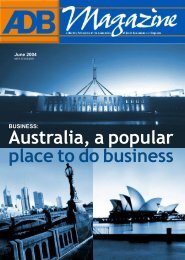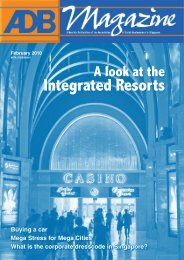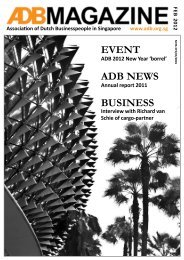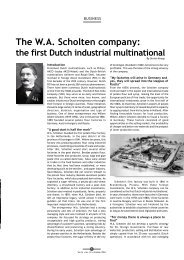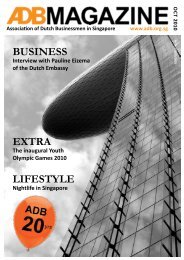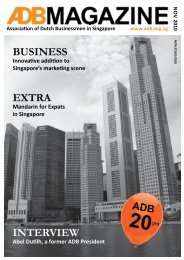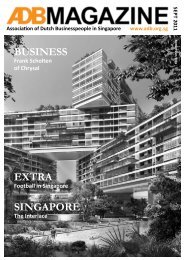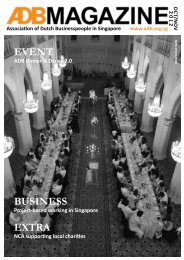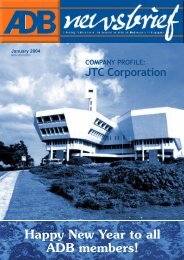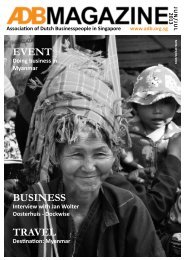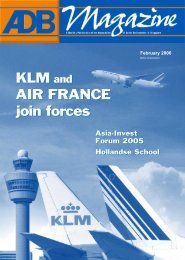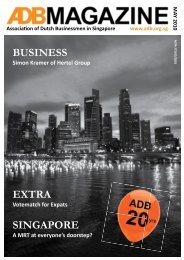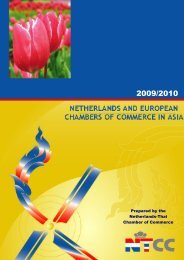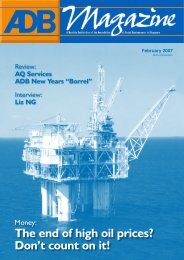Sept 2005 - Association of Dutch Businessmen
Sept 2005 - Association of Dutch Businessmen
Sept 2005 - Association of Dutch Businessmen
Create successful ePaper yourself
Turn your PDF publications into a flip-book with our unique Google optimized e-Paper software.
<strong>Sept</strong>ember <strong>2005</strong><br />
MITA 373/03/2001
PROLOGUE<br />
Dear members,<br />
I recently joined the ADB board and have the honour <strong>of</strong> writing my first prologue for this<br />
excellent magazine. I would like to take this opportunity to introduce myself. My name is<br />
Remco Muzerie and I have been living with my family (two kids) already for 5 years in<br />
Singapore. My pr<strong>of</strong>ession lies in the telecommunication world.<br />
Remco Muzerie<br />
I also would like to take this opportunity to say farewell to one <strong>of</strong> our board members.<br />
Jeroen Keunen is unfortunately stepping out <strong>of</strong> the board due to his busy travel schedules.<br />
Jeroen, on behalf <strong>of</strong> the ADB I would like to thank you for all the contributions you have<br />
done for our organization in the past three years.<br />
As usual the Black Tie Dinner was a success (see pictures on Pg 3). On behalf <strong>of</strong> the board<br />
and the members I would like to thank Unilever for sponsoring our 14th Annual Black Tie<br />
Dinner. For obvious reasons our members always appreciate this event and it is also a good<br />
way <strong>of</strong> getting to know each other better. Of course for many <strong>of</strong> us it was also the first<br />
opportunity to meet our guest <strong>of</strong> honour, His Excellency Mr. Chris C. Sanders Ambassador<br />
<strong>of</strong> the Kingdom <strong>of</strong> the Netherlands to Singapore and Brunei Darussalam.<br />
We are also going to have a couple <strong>of</strong> very interesting activities in the coming months. Our<br />
upcoming event will take place on 12th <strong>of</strong> <strong>Sept</strong>ember. This event will bring together a<br />
panel <strong>of</strong> pr<strong>of</strong>essionals who will discuss sustainable development from a business perspective<br />
with the title ‘Your Business Strategy and the Environment; Integration or Marketing?’<br />
Please read more about it in ‘<strong>Association</strong> Info’.<br />
The board has already started filling up 2006 with interesting events. However, I would<br />
like to invite all the members to come up with opportunities <strong>of</strong> getting high quality speakers.<br />
There is always an interest for high pr<strong>of</strong>ile speakers, which suits our members and potential<br />
members alike!<br />
Hope to see you soon.<br />
Warm regards,<br />
Remco Muzerie<br />
Bram Steenks<br />
Frans van de Bospoort Charlotte Ruegg Wim Samlal Jeroen Keunen Matthieu Quere Freddy Meindertsma<br />
1<br />
Vol.15 • No. 7 • <strong>Sept</strong>ember <strong>2005</strong>
A monthly publication <strong>of</strong> the<br />
<strong>Association</strong> <strong>of</strong> <strong>Dutch</strong> <strong>Businessmen</strong><br />
ADB BOARD<br />
Bram SteenksPresident<br />
Frans van de Bospoort<br />
Vice-President<br />
Charlotte Ruegg<br />
Honorary Secretary<br />
Wim Samlal<br />
Honorary Treasurer<br />
Jeroen Keunen<br />
Member<br />
Remco Muzerie<br />
Member<br />
Matthieu Quere<br />
Member<br />
Freddy Meindertsma<br />
Member<br />
EDITORIAL COMMITTEE<br />
Wieteke Dijkxhoorn<br />
Jeroen de Koning<br />
Debby Reemers<br />
Brigitte Velema<br />
Lineke van Nederpelt<br />
Michael van Ommeren<br />
Barry Doesburg<br />
Wil Kolen<br />
SECRETARIAT<br />
Lineke van Nederpelt<br />
Mailing Address:<br />
c/o 22 Camden Park, Singapore 299814<br />
Telephone: 9101 6201<br />
email: adb@pacific.net.sg<br />
Contents<br />
PROLOGUE 1<br />
REVIEW<br />
ADB Black Tie Dinner 3<br />
BUSINESS<br />
Reuters – A global financial 4<br />
information company<br />
An inspiring speech and an important message 6<br />
ASIA<br />
For Fame & Glory - 11<br />
The 30 th Olympic Games in Beijing<br />
Website : www.adb.org.sg<br />
Email : webmaster@adb.org.sg<br />
Editorial contributions for the next issue may<br />
be sent or handed over to the ADB Secretariat,<br />
before or on the day <strong>of</strong> the monthly ADB<br />
meeting. The contents <strong>of</strong> this magazine are partly<br />
based on information received from third parties.<br />
The Committee does not take responsibility<br />
for the correctness <strong>of</strong> the articles.<br />
Designed by Jennifer Phua<br />
Printed by Khoo Sun Printing Pte Ltd<br />
MITA 373/03/2001<br />
Membership fee is S$ 100 per calendar year.<br />
For registration, please see the website<br />
www.adb.org.sg/en_member_signup.htm.<br />
Membership is renewed automatically effective the<br />
first month <strong>of</strong> the new calendar year.<br />
Make your cheque payable to “Assocation <strong>of</strong> <strong>Dutch</strong><br />
<strong>Businessmen</strong>” and send to ADB, c/o 22 Camden Park,<br />
Singapore 299814.<br />
Termination <strong>of</strong> membership must be received by<br />
ADB Secretariat in writing before 1 January, otherwise<br />
you will be charged for the full amount for the following<br />
calendar year.<br />
Please notify the ADB secretariat <strong>of</strong> any changes in<br />
employer, (email) addresses or any other personal<br />
particulars that might be <strong>of</strong> interest to the ADB<br />
administration.<br />
SINGAPORE<br />
The transformation <strong>of</strong> Singapore’s City Centre 14<br />
BIZZ AGENDA 16<br />
KNOW YOUR TAX<br />
Indonesian financing transactions: 19<br />
from 0% tax to 20% tax?<br />
DUTCH NEWS 20<br />
POP & DROP A QUESTION<br />
Banda Aceh, working for Doctors 22<br />
without Borders<br />
EMBASSY INFO 23<br />
ASSOCIATION INFO 24<br />
2<br />
Vol.15 • No. 7 • <strong>Sept</strong>ember <strong>2005</strong>
▼<br />
REVIEW<br />
ADB Black Tie Dinner<br />
A very successful ADB Black Tie Dinner was held<br />
on the 27 th August. Eighty persons attended this<br />
popular event at the Hollandse Club. As usual<br />
Chef Woon and Mr. Boon and their staff prepared<br />
and presented an excellent 5-course dinner<br />
accompanied by selected wines from all over<br />
the world, followed by an enjoyable party till<br />
the early hours. His Excellency Mr. Chris C.<br />
Sanders Ambassador-designate <strong>of</strong> the Kingdom<br />
<strong>of</strong> the Netherlands to Singapore was the guest<br />
<strong>of</strong> honour.<br />
Kindly sponsored by Unilever<br />
His Excellency Mr. Chris C. Sanders<br />
and Mrs. Marianne Sanders<br />
Margreet van Vliet and Chef Woon<br />
Bram Steenks<br />
▼<br />
A drink before dinner<br />
Overview<br />
Music during dinner<br />
Rob and Betty van Zwieteren, David and<br />
Karianne Blackmon, Peter van Rossum<br />
Caroline Ruijg, Menno Douwes Dekker,<br />
Claudette Dumoulin<br />
Marijke den Ouden, Eduard and Marleen<br />
Holtz, Jeroen and Marleen Keunen,<br />
Edward Tonino<br />
Charlotte Ruegg, Gilbert Ruegg, Boele<br />
de Bie, Rutger van Thiel, Etteke de Bie,<br />
Mylene van Thiel, Nienke Vergouwen<br />
Music after dinner<br />
More pictures at www.adb.org.sg<br />
3<br />
Vol.15 • No. 7 • <strong>Sept</strong>ember <strong>2005</strong>
BUSINESS<br />
A global financial information company<br />
By Erik de Boer<br />
Reuters<br />
is commonly<br />
known as the<br />
world’s largest<br />
international<br />
multimedia<br />
news agency,<br />
more than 90%<br />
<strong>of</strong> its revenue<br />
actually derives<br />
from its<br />
financial<br />
services<br />
business.<br />
Reuters is a global information company. Reuters<br />
provides indispensable information tailored for<br />
pr<strong>of</strong>essionals in the financial services, media<br />
and corporate markets. Owing to a reputation<br />
for speed, accuracy and independence our<br />
information is trusted and drives decision making<br />
across the globe.<br />
Although Reuters is commonly known as the<br />
world’s largest international multimedia news<br />
agency, more than 90% <strong>of</strong> its revenue actually<br />
derives from its financial services business. Reuters<br />
serves some 328.000 financial market pr<strong>of</strong>essionals<br />
working in the financial markets around the world.<br />
Reuters aims to provide them with the high-value<br />
content and tools they need to compete in their<br />
markets.<br />
The company’s core strengths lie in providing<br />
the content, analytics, trading and messaging<br />
capabilities needed by financial pr<strong>of</strong>essionals.<br />
Reuters chooses to use open technology in its<br />
products, based on industry standards. This enables<br />
customers to search, store and integrate financial<br />
information with content from other sources, such<br />
as in-house databases. Reuters also provides<br />
these users with specially designed tools to help<br />
them reduce risk, distribute and manage the<br />
ever-increasing volumes <strong>of</strong> market data, and<br />
<strong>of</strong>fers bespoke automated trading products for<br />
the Treasury market.<br />
Serving a Diverse Audience<br />
The vast majority <strong>of</strong> Reuters revenue is derived<br />
from the financial products and services business.<br />
These customers make up a highly diverse<br />
audience. Operating in the dynamic financial<br />
markets, they deal in equities, fixed income,<br />
foreign exchange, money, commodities and energy<br />
markets. They rely on a range <strong>of</strong> workstations,<br />
trading tools and other products to gain a<br />
competitive advantage. Based on the shared<br />
needs <strong>of</strong> those communities, Reuters operates its<br />
business through four divisions:<br />
Institutional Sales & Trading. The Institutional<br />
Sales & Trading division focuses on Reuters core<br />
business among its sales and trading end-users who<br />
are dealing in the foreign exchange, fixed income,<br />
equities, commodities and energy and related<br />
markets. In the <strong>of</strong>fering for this segment, Reuters<br />
combines cross-market data with analytics,<br />
charting capabilities, news and transaction<br />
capabilities. The intent is to give traders and<br />
salespeople the tools they need to interpret,<br />
communicate and trade across all markets or a<br />
specific market or region.<br />
The Reuters Messaging system, for example,<br />
is a secure instant messaging tool that enables<br />
financial market pr<strong>of</strong>essionals to connect in<br />
real-time with clients and colleagues to discuss<br />
anything from potential trades to arranging a<br />
drink.<br />
Research & Asset Management. The Research<br />
& Asset Management division concentrates on<br />
supporting end-users such as portfolio managers,<br />
wealth managers, investment bankers and research<br />
analysts in making complex financial decisions<br />
outside <strong>of</strong> the sales and trading environment. This<br />
segment <strong>of</strong> clients requires a combination <strong>of</strong><br />
real-time estimates, research and fundamental<br />
data together with comprehensive news and<br />
pricing information.<br />
Enterprise. The Enterprise division targets the<br />
complete business enterprise as a customer, as<br />
distinct from the individual end-user. While less<br />
visible than the frontline information terminals,<br />
these enterprise-wide products are geared towards<br />
helping the entire organization work smarter.<br />
The Enterprise division focuses on enterprise<br />
information distribution systems, risk and<br />
enterprise information products. This includes realtime<br />
datafeeds to fuel enterprise-wide operations;<br />
connectivity to trading venues and liquidity; and<br />
risk management solutions that enable banks to<br />
better manage risk.<br />
Media. In addition to market pr<strong>of</strong>essionals who<br />
rely on news to trade and make decisions, Reuters<br />
supplies news – text, graphics, video and pictures<br />
– to media organisations and web sites across the<br />
globe. The Media division focuses on the wholesale<br />
media business and serves the needs <strong>of</strong> the world’s<br />
newspapers, magazines, television and cable<br />
networks, radio stations, websites and consumers<br />
(through www.reuters.com).<br />
Reuters News: Breaking the news first<br />
Reuters is the world’s trusted independent source<br />
for news and information. Since 1851, Reuters<br />
journalists have been at the frontlines reporting<br />
world-shaping events as they happen. Every day,<br />
approximately 30,000 headlines, including third<br />
party contributions, and over eight million words<br />
4<br />
Vol.15 • No. 7 • <strong>Sept</strong>ember <strong>2005</strong>
BUSINESS<br />
Fact File:<br />
• Founded in London in 1851<br />
• Over 14,700 staff in 92 countries<br />
• More than 328,000 pr<strong>of</strong>essional users worldwide<br />
• Reuters Group 2 004 revenue: £2.8 billion<br />
• Constituent <strong>of</strong> FTSE100 index<br />
• Listed on LSE (RTR) and NASDAQ (RTRSY)<br />
are published in 19 languages. Today, Reuters<br />
supplies breaking news on politics, business, sports<br />
and entertainment to publishers and broadcasters<br />
worldwide.<br />
Trust is increasingly becoming a central issue<br />
in providing news. Digital technologies have made<br />
it easier than ever to become a news provider.<br />
However, to become a trustworthy news provider<br />
is much harder. Reuters News continues to be based<br />
on the Reuters values <strong>of</strong> independence, freedom<br />
from bias, speed and accuracy. 1<br />
Reuters Consumer Services <strong>of</strong>fers a personal<br />
multimedia news and information service to<br />
investors and business pr<strong>of</strong>essional in the UK, US<br />
and Japan. The information is delivered on<br />
multiple platforms including online, mobile and<br />
interactive TV. Over one billion people see Reuters<br />
news every day.<br />
Reuters Foundation: Making a<br />
difference<br />
The Reuters Foundation is an educational and<br />
humanitarian trust funded by Reuters. It embraces<br />
especially educational, humanitarian and<br />
environmental projects, including the training<br />
<strong>of</strong> thousands <strong>of</strong> journalists from developing<br />
countries, and providing news to international<br />
disaster relief organisations.<br />
Reuters in Singapore<br />
Reuters operation in Singapore dates back to<br />
1868 and is now 137 years here. Since then, the<br />
company’s operations have seen some tremendous<br />
growth.<br />
Powering the financial markets with:<br />
• Information on 40,000 companies<br />
• Financial information from 258 exchanges and OTC markets<br />
• Financial data updated at 8,000 times per second, and at peak time up<br />
to 23,000 times per second<br />
• The largest dealing network community with more than 17,000 foreign<br />
exchange and money market traders<br />
• The world’s largest international multimedia news and television agency<br />
network - 2,300 editorial staff, journalists, photographers and camera<br />
operators in 196 bureaux<br />
• Among the most read news sources on the Internet reaching millions in<br />
their <strong>of</strong>fices, homes or on PDAs<br />
In addition to becoming a headquarters for<br />
Reuters in the region, Singapore is now also base<br />
to Reuters ASEAN channel business operations.<br />
Today, the company employs 650 staff in Singapore.<br />
Reuters Asia Pte Ltd, the Asia Pacific headquarters<br />
<strong>of</strong> Reuters, has been based in Singapore since 1997.<br />
In 1992, Reuters invested 43 million Singapore<br />
dollars in its Science Park building. Three years<br />
later, Reuters opened its Main Technical Centre,<br />
which is one <strong>of</strong> three global hubs that ensure<br />
customers have continued access to Reuters news<br />
and information. In 1997, Reuters Asia’s sphere <strong>of</strong><br />
responsibilities expanded to encompass activities<br />
such as the World Editorial Desk.<br />
Reuters has a global network <strong>of</strong> 600 news<br />
photographers who deliver a world-class collection<br />
<strong>of</strong> news, sports and entertainment photography.<br />
In April <strong>2005</strong> Reuters chose Singapore as its base<br />
for the company’s Global Pictures Desk, at the<br />
Singapore Science Park. This pictures desk has<br />
grown from seven staff to 40 since then. The<br />
expansion enables Reuters to receive, process and<br />
transmit pictures to the world’s 1500 media<br />
companies around the clock from Singapore.<br />
Reuters supports local tertiary institutions<br />
and pr<strong>of</strong>essional associations. In Singapore, the<br />
company has supplied about 50 million SGD in<br />
online information services to educational entities<br />
such as the Wealth Management Institute, National<br />
University <strong>of</strong> Singapore and the Polytechnics.<br />
To find out more about Reuters please visit<br />
www.reuters.com, or feel free to contact Erik de<br />
Boer via email on erik.deboer@reuters.com.<br />
1 Adapted from: Tom Glocer - Reuters CEO, ‘The aim is truth’,<br />
FT.com site, Jul 12, 2004<br />
5<br />
Vol.15 • No. 7 • <strong>Sept</strong>ember <strong>2005</strong>
BUSINESS<br />
An inspiring speech<br />
and an important message<br />
Stanford Report, June 14, <strong>2005</strong><br />
®<br />
‘You’ve got to find what you love,’ Jobs says<br />
This is the text <strong>of</strong> the Commencement address<br />
by Steve Jobs, CEO <strong>of</strong> Apple Computer and <strong>of</strong> Pixar<br />
Animation Studios, delivered on June 12, <strong>2005</strong>.<br />
I am honored to be with you today at your<br />
commencement from one <strong>of</strong> the finest universities<br />
in the world. I never graduated from college. Truth<br />
be told, this is the closest I’ve ever gotten to a<br />
college graduation. Today I want to tell you three<br />
stories from my life. That’s it. No big deal.<br />
Just three stories.<br />
The first story is about connecting the dots.<br />
I dropped out <strong>of</strong> Reed College after the first 6<br />
months, but then stayed around as a drop-in for<br />
another 18 months or so before I really quit.<br />
So why did I drop out?<br />
It started before I was born. My biological<br />
mother was a young, unwed college graduate<br />
student, and she decided to put me up for adoption.<br />
She felt very strongly that I should be adopted by<br />
college graduates, so everything was all set for<br />
me to be adopted at birth by a lawyer and his wife.<br />
Except that when I popped out they decided at<br />
the last minute that they really wanted a girl. So<br />
my parents, who were on a waiting list, got a call<br />
in the middle <strong>of</strong> the night asking: “We have an<br />
unexpected baby boy; do you want him?” They said:<br />
“Of course.”<br />
My biological mother later found out that my<br />
mother had never graduated from college and that<br />
my father had never graduated from high school.<br />
She refused to sign the final adoption papers. She<br />
only relented a few months later when my parents<br />
promised that I would someday go to college.<br />
And 17 years later I did go to college. But I<br />
naively chose a college that was almost as<br />
expensive as Stanford, and all <strong>of</strong> my working-class<br />
parents’ savings were being spent on my college<br />
tuition. After six months, I couldn’t see the value<br />
in it. I had no idea what I wanted to do with my<br />
life and no idea how college was going to help me<br />
figure it out.<br />
And here I was spending all <strong>of</strong> the money my<br />
parents had saved their entire life. So I decided to<br />
drop out and trust that it would all work out OK. It<br />
was pretty scary at the time, but looking back it<br />
was one <strong>of</strong> the best decisions I ever made. The<br />
minute I dropped out I could stop taking the<br />
required classes that didn’t interest me, and begin<br />
dropping in on the ones that looked interesting.<br />
It wasn’t all romantic. I didn’t have a dorm<br />
room, so I slept on the floor in friends’rooms, I<br />
returned coke bottles for the 5¢ deposits to buy<br />
food with, and I would walk the 7 miles across town<br />
every Sunday night to get one good meal a week<br />
at the Hare Krishna temple. I loved it. And much<br />
<strong>of</strong> what I stumbled into by following my curiosity<br />
and intuition turned out to be priceless later on.<br />
Let me give you one example:<br />
Reed College at that time <strong>of</strong>fered perhaps the<br />
best calligraphy instruction in the country.<br />
Throughout the campus every poster, every<br />
label on every drawer, was beautifully hand<br />
calligraphed. Because I had dropped out and didn’t<br />
have to take the normal classes, I decided to take<br />
a calligraphy class to learn how to do this. I learned<br />
about serif and san serif typefaces, about varying<br />
the amount <strong>of</strong> space between different letter<br />
combinations, about what makes great typography<br />
great. It was beautiful, historical, artistically subtle<br />
in a way that science can’t capture, and I found it<br />
fascinating.<br />
None <strong>of</strong> this had even a hope <strong>of</strong> any practical<br />
application in my life. But ten years later, when<br />
we were designing the first Macintosh computer,<br />
it all came back to me. And we designed it all into<br />
the Mac. It was the first computer with beautiful<br />
typography. If I had never dropped in on that single<br />
course in college, the Mac would have never had<br />
multiple typefaces or proportionally spaced fonts.<br />
And since Windows just copied the Mac, it’s likely<br />
that no personal computer would have them. If I<br />
had never dropped out, I would have never dropped<br />
in on this calligraphy class, and personal computers<br />
might not have the wonderful typography that they<br />
do. Of course it was impossible to connect the dots<br />
looking forward when I was in college. But it was<br />
very, very clear looking backwards ten years later.<br />
Again, you can’t connect the dots looking<br />
forward; you can only connect them looking<br />
backwards. So you have to trust that the dots will<br />
somehow connect in your future. You have to trust<br />
in something - your gut, destiny, life, karma,<br />
whatever. This approach has never let me down,<br />
and it has made all the difference in my life.<br />
My second story is about love and loss.<br />
I was lucky - I found what I loved to do early in<br />
life. Woz and I started Apple in my parents garage<br />
6<br />
Vol.15 • No. 7 • <strong>Sept</strong>ember <strong>2005</strong>
BUSINESS<br />
when I was 20. We worked hard,<br />
and in 10 years Apple had<br />
grown from just the two <strong>of</strong><br />
us in a garage into a $2 billion<br />
company with over 4000<br />
employees. We had just<br />
released our finest creation -<br />
the Macintosh - a year earlier,<br />
and I had just turned 30. And then<br />
I got fired. How can you get fired from a company<br />
you started?<br />
Well, as Apple grew we hired someone who I<br />
thought was very talented to run the company with<br />
me, and for the first year or so things went well.<br />
But then our visions <strong>of</strong> the future began to diverge<br />
and eventually we had a falling out. When we did,<br />
our Board <strong>of</strong> Directors sided with him. So at 30 I<br />
was out.<br />
And very publicly out. What had been the focus<br />
<strong>of</strong> my entire adult life was gone, and it was<br />
devastating.<br />
I really didn’t know what to do for a few<br />
months. I felt that I had let the previous generation<br />
<strong>of</strong> entrepreneurs down - that I had dropped the<br />
batonas it was being passed to me.<br />
I met with David Packard and Bob Noyce and<br />
tried to apologize for screwing up so badly. I was a<br />
very public failure, and I even thought about<br />
running away from the valley. But something slowly<br />
began to dawn on me - I still loved what I did. The<br />
turn <strong>of</strong> events at Apple had not changed that one<br />
bit. I had been rejected, but I was still in love.<br />
And so I decided to start over.<br />
I didn’t see it then, but it turned out that<br />
getting fired from Apple was the best thing that<br />
could have ever happened to me. The heaviness<br />
<strong>of</strong> being successful was replaced by the lightness<br />
<strong>of</strong> being a beginner again, less sure about<br />
everything. It freed me to enter one <strong>of</strong> the most<br />
creative periods <strong>of</strong> my life.<br />
During the next five years, I started a company<br />
named NeXT, another company named Pixar, and<br />
fell in love with an amazing woman who would<br />
You’ve got to find what you love. And that<br />
is as true for your work as it is for your lovers.<br />
Your work is going to fill a large part <strong>of</strong> your life,<br />
and the only way to be truly satisfied is to do<br />
what you believe is great work. And the only way<br />
to do great work is to love what you do.<br />
become my wife. Pixar went on to create the worlds<br />
first computer animated feature film, Toy Story,<br />
and is now the most successful animation studio in<br />
the world. In a remarkable turn <strong>of</strong> events, Apple<br />
bought NeXT, I retuned to Apple, and the<br />
technology we developed at NeXT is at the heart<br />
<strong>of</strong> Apple’s current renaissance.<br />
And Laurene and I have a wonderful family<br />
together.<br />
I’m pretty sure none <strong>of</strong> this would have<br />
happened if I hadn’t been fired from Apple. It awful<br />
tasted medicine, but I guess the patient needed<br />
it. Sometimes life hits you in the head with a brick.<br />
Don’t lose faith. I’m convinced that the only thing<br />
that kept me going was that I loved what I did.<br />
You’ve got to find what you love. And that is as<br />
true for your work as it is for your lovers. Your<br />
work is going to fill a large part <strong>of</strong> your life, and<br />
the only way to be truly satisfied is to do what you<br />
believe is great work. And the only way to do great<br />
work is to love what you do. If you haven’t found<br />
it yet, keep looking. Don’t settle. As with all<br />
matters <strong>of</strong> the heart, you’ll know when you find<br />
it. And, like any great relationship, it just gets<br />
better and better as the years roll on. So keep<br />
looking until you find it. Don’t settle.<br />
My third story is about death.<br />
When I was 17, I read a quote that went<br />
something like: “If you live each day as if it was<br />
your last, someday you’ll most certainly be right.”<br />
It made an impression on me, and since then, for<br />
the past 33 years, I have looked in the mirror every<br />
morning and asked myself: “If today were the last<br />
day <strong>of</strong> my life, would I want to do what I am about<br />
to do today?” And whenever the answer has been<br />
“No” for too many days in a row, I know I need to<br />
change something.<br />
Remembering that I’ll be dead soon is the most<br />
important tool I’ve ever encountered to help me<br />
make the big choices in life. Because almost<br />
everything - all external expectations, all pride,<br />
all fear <strong>of</strong> embarrassment or failure - these things<br />
just fall away in the face <strong>of</strong> death, leaving only<br />
what is truly important.<br />
Remembering that you are going to die is the<br />
best way I know to avoid the trap <strong>of</strong> thinking you<br />
have something to lose. You are already naked.<br />
There is no reason not to follow your heart.<br />
9<br />
Vol.15 • No. 7 • <strong>Sept</strong>ember <strong>2005</strong>
BUSINESS<br />
the doctors started crying because it turned out<br />
to be a very rare form <strong>of</strong> pancreatic cancer that is<br />
curable with surgery.<br />
I had the surgery and I’m fine now.<br />
This was the closest I’ve been to facing death,<br />
and I hope it’s the closest I get for a few more<br />
decades. Having lived through it, I can now say<br />
this to you with a bit more certainty than when<br />
death was a useful but purely intellectual<br />
About a year ago I was diagnosed with cancer.<br />
I had a scan at 7:30 in the morning, and it clearly<br />
showed a tumor on my pancreas. I didn’t even know<br />
what a pancreas was. The doctors told me this was<br />
almost certainly a type <strong>of</strong> cancer that is incurable,<br />
and that I should expect to live no longer than<br />
three to six months. My doctor advised me to go<br />
home and get my affairs in order, which is doctor’s<br />
code for prepare to die. It means to try to tell<br />
your kids everything you thought you’d have the<br />
next 10 years to tell them in just a few months. It<br />
means to make sure everything is buttoned up so<br />
that it will be as easy as possible for your family. It<br />
means to say your goodbyes.<br />
I lived with that diagnosis all day. Later that<br />
evening I had a biopsy, where they stuck an<br />
endoscope down my throat, through my stomach<br />
and into my intestines, put a needle into my<br />
pancreas and got a few cells from the tumor. I was<br />
sedated, but my wife, who was there, told me that<br />
when they viewed the cells under a microscope<br />
Concept:<br />
No one wants to die. Even people who want to<br />
go to heaven don’t want to die to get there. And<br />
yet death is the destination we all share. No one<br />
has ever escaped it. And that is as it should be,<br />
because Death is very likely the single best<br />
invention <strong>of</strong> Life. It is Life’s change agent. It clears<br />
out the old to make way for the new. Right now<br />
the new is you, but someday not too long from<br />
now, you will gradually become the old and be<br />
cleared away.<br />
Sorry to be so dramatic, but it is quite true.<br />
Your time is limited, so don’t waste it living<br />
someone else’s life. Don’t be trapped by dogma -<br />
Which is living with the results <strong>of</strong> other people’s<br />
thinking. Don’t let the noise <strong>of</strong> other’s opinions<br />
drown out your own inner voice. And most<br />
important, have the courage to follow your heart<br />
and intuition. They somehow already know what<br />
you truly want to become.<br />
Everything else is secondary.<br />
When I was young, there was an amazing<br />
publication called The Whole Earth Catalog, which<br />
was one <strong>of</strong> the bibles <strong>of</strong> my generation.<br />
It was created by a fellow named Stewart<br />
Brand not far from here in Menlo Park, and he<br />
brought it to life with his poetic touch. This was in<br />
the late 1960’s, before personal computers and<br />
desktop publishing, so it was all made with<br />
typewriters, scissors, and Polaroid cameras. It was<br />
sort <strong>of</strong> like Google in paperback form, 35 years<br />
before Google came along: it was idealistic, and<br />
overflowing with neat tools and great notions.<br />
Stewart and his team put out several issues <strong>of</strong><br />
The Whole Earth Catalog, and then when it had<br />
run its course, they put out a final issue. It was<br />
the mid-1970s, and I was your age. On the back<br />
cover <strong>of</strong> their final issue was a photograph <strong>of</strong> an<br />
early morning country road, the kind you might<br />
find yourself hitchhiking on if you were so<br />
adventurous. Beneath it were the words: “Stay<br />
Hungry. Stay Foolish.” It was their farewell message<br />
as they signed <strong>of</strong>f. Stay Hungry. Stay Foolish. And I<br />
have always wished that for myself. And now, as<br />
you graduate to begin anew, I wish that for you.<br />
Stay Hungry. Stay Foolish.<br />
Thank you all very much.<br />
10<br />
Vol.15 • No. 7 • <strong>Sept</strong>ember <strong>2005</strong>
ASIA<br />
For Fame & Glory -<br />
The 30 th Olympic Games in Beijing<br />
By Barry Doesburg<br />
The 117 th International Olympic Committee Meeting<br />
in Singapore was not one to be missed. For sure<br />
the media did not. From July 6 th to 9 th the entire<br />
IOC, over 100 voting members, together with the<br />
organizing committees <strong>of</strong> the five candidate cities<br />
gathered in the Raffles Ballroom <strong>of</strong> the Raffles City<br />
Convention Centre to elect the host city <strong>of</strong> the<br />
Games <strong>of</strong> the XXX Olympiad in 2012. London beat<br />
Paris in the final round<br />
<strong>of</strong> voting by 54 votes to<br />
50. This will be the first<br />
time that a city will host<br />
the Olympic Games for<br />
the third time. London<br />
hosted the Games in<br />
1908 and 1948. The other Candidate Cities Paris,<br />
New York, Moscow and Madrid were thanked by<br />
IOC President Jacques Rogge for their excellent<br />
efforts and the quality <strong>of</strong> their candidatures.<br />
Once more, it became clear that the Olympic<br />
Games are much more than just a sporting<br />
event. History, pride, patriotism, politics, media<br />
attention, tourism, enormous budgets boosting the<br />
economy and infrastructure, are raising the stakes<br />
high. The toughest and most prestigious battles<br />
are fought seven years before the torch even hits<br />
the fire. The British brought Tony Blair and David<br />
Beckham; the French had Jacques Chirac to support<br />
their bid. The IOC itself is not very shy <strong>of</strong> prestige<br />
either. It is full <strong>of</strong> royalty: Prince Willem Alexander<br />
<strong>of</strong> Orange, Le Grand-Duc de Luxembourg, Princess<br />
Nora <strong>of</strong> Liechtenstein, HRH Princess Royal <strong>of</strong><br />
Great Britain and Price Albert II <strong>of</strong> Monaco are all<br />
members.<br />
China knows it, desperately needs it and no<br />
doubt will make the Games to a big success, the<br />
Chinese way. The dragon has many faces. And the<br />
timing is perfect!<br />
Some Background<br />
The Beijing 2008 Games will take<br />
place from 8 August 2008 until 24<br />
August 2008. Approximately 10,500<br />
athletes are expected to participate<br />
in the Games with around 20,000<br />
reporters, photographers and<br />
cameramen bringing the Games to the world.<br />
That’s 2 media staff for each athlete!<br />
The <strong>of</strong>ficial emblem <strong>of</strong> Beijing 2008 entitled<br />
“Chinese Seal-Dancing Beijing” combines the<br />
Chinese seal and the art <strong>of</strong> calligraphy with sporting<br />
features, transforming the elements into a human<br />
figure running forward and embracing triumph. The<br />
figure resembles the Chinese character “Jing”,<br />
which stands for the name <strong>of</strong> the host city and<br />
represents a particularly significant Chinese style.<br />
The artwork embodies four messages: Chinese<br />
culture, the color <strong>of</strong> red China, Beijing welcomes<br />
friends from all over the world and to promote<br />
the Olympic motto <strong>of</strong> ‘Citius, Altius, Fortius’<br />
(Faster, Higher, Stronger).<br />
Economics & Infrastructure<br />
Beijing will experience a major boost in its world<br />
standing in connection with the Olympics and is<br />
hoping to cash in with total investments in the city<br />
expected to exceed US$182 billion. Of this US$34<br />
billion will be pumped into the city’s infrastructure<br />
and service industry and more than US$36 billion<br />
in the development <strong>of</strong> finance, trade, logistics,<br />
exhibitions and tourism sectors. Another US$3.7<br />
billion will go on 400km <strong>of</strong> new expressways, US$6.7<br />
billion on public transport (among others 4 new<br />
subway lines) and other roads and US$4.4 billion<br />
on environment protection. And so it goes on.<br />
Altogether it will be one <strong>of</strong> the largest construction<br />
projects ever in China since the construction <strong>of</strong><br />
the Great Wall.<br />
Beijing mayor Wang Qishan explained that in<br />
terms <strong>of</strong> urban development, China’s capital lagged<br />
far behind previous host cities as Sydney and<br />
Atlanta. It still has 400 villages on its outskirts and<br />
hotels and hospitals are all concentrated in the<br />
city centre. One <strong>of</strong> the most urgent needs is to<br />
develop housing, roads and other infrastructure in<br />
outlying areas to diffuse the 14 million people and<br />
2 million cars (The Straits Times, 21/05/<strong>2005</strong>). To<br />
improve the safety <strong>of</strong> the athletes and all visitors<br />
during the Games. The security budget is likely to<br />
top the US$1.3 billion spent in Athens.<br />
Other cities will be involved as well in the<br />
Olympics. The Organising Committee for the<br />
Games (BOCOG) has announced that partnership<br />
agreements have been signed with four cities<br />
outside Beijing, that will host the football<br />
preliminaries during the 2008 Games: Tianjin,<br />
Shanghai, Shenyang and Qinhuangdao. The<br />
equestrian events will be held in Hong Kong for<br />
the welfare <strong>of</strong> the horses.<br />
The Olympic village, which covers a total area<br />
<strong>of</strong> 66 hectares, lies at the North end <strong>of</strong> Beijing’s<br />
central axis and has the Olympic Forrest Park to<br />
its North and the major Olympic venues to its South.<br />
The village will join a long list <strong>of</strong> important sites<br />
11<br />
Vol.15 • No. 7 • <strong>Sept</strong>ember <strong>2005</strong>
ASIA<br />
It is expected<br />
that the Games<br />
will at least add<br />
another 0.3-0.4%<br />
to the gross<br />
domestic product.<br />
Western<br />
economists<br />
assume that the<br />
Olympic Games<br />
speed up the<br />
development and<br />
may save as much<br />
as ten years.<br />
According to the<br />
Beijing City Tax<br />
Department for<br />
every 10 billion<br />
yuan spent on<br />
the Olympics,<br />
GDP will increase<br />
with 3.7 billion<br />
yuan.<br />
www.as-p.de<br />
on the central axis, including the Forbidden City -<br />
getting a thorough makeover before the Games -<br />
and the Temple <strong>of</strong> Heaven. Once the Games are<br />
over, the village will be taken over by a private<br />
development company, who will remodel the<br />
apartments into residential buildings.<br />
Architecture<br />
It is expected that the Games will at least add<br />
another 0.3-0.4% to the gross domestic product.<br />
Western economists assume that the Olympic<br />
Games speed up the development and may save as<br />
much as ten years. According to the Beijing City<br />
Tax Department for every 10 billion yuan spent on<br />
the Olympics, GDP will increase with 3.7 billion<br />
yuan. The sector likely to benefit most from the<br />
Games is <strong>of</strong> course the construction industry;<br />
they are winners already.<br />
The reinvention <strong>of</strong> Beijing as a modern<br />
international city ready to host the 2008 Summer<br />
Olympic Games has presented Chinese planners<br />
with a dilemma - how to reconcile imported<br />
design ideas from the West with China’s unique<br />
architectural heritage. A score <strong>of</strong> landmark<br />
projects defining the future face <strong>of</strong> Beijing has<br />
been awarded to foreign architects. For example,<br />
what is dubbed Beijing’s first European-style<br />
skyscraper, which will host the headquarters <strong>of</strong><br />
China Central Television, is on the drawing boards<br />
<strong>of</strong> <strong>Dutch</strong> architects from the Office for Metropolitan<br />
Architecture.<br />
One <strong>of</strong> the most interesting projects is that <strong>of</strong><br />
renowned German architect, Albert Speer Jr., who<br />
has designed an ambitious plan to build a 25-<br />
kilometer boulevard (north-south axis) across the<br />
city that will connect the new Olympic Park in<br />
the north with the Imperial Forbidden City and<br />
Tiananmen Square in the city center. This urban<br />
planner happens to be the son <strong>of</strong> Adolf Hitler’s<br />
personal architect, Albert Speer and the choice<br />
has stirred many ghosts from the past in Germany,<br />
where architects have suggested that there is an<br />
uncanny parallel between the Beijing axis <strong>of</strong> Albert<br />
Speer Jr. and the north-south axis planned by the<br />
elder Speer for Hitler’s new Berlin, which was to<br />
be called “world capital Germania”. Of this great<br />
world capital, which was to house ten million and<br />
be completed in 1950, only the foundations were<br />
ever laid, when the big chancellery <strong>of</strong> Germania<br />
was built in 1936.<br />
The sixty-eight-year-old Speer responds to<br />
these accusations <strong>of</strong> having dug up a Nazi town<br />
planning project with these words: “It is an<br />
unfortunate fact that comparisons with my father<br />
are inevitable, but I want to help ferry Beijing<br />
into the new millennium. The Berlin project in the<br />
’30s was just megalomania”. Setting aside these<br />
likeline, Speer Jr’s project <strong>of</strong>fers a number <strong>of</strong><br />
responses to urban issues in Beijing. Above all, its<br />
big pollution problem is solved by recycling water<br />
or rainwater, use <strong>of</strong> alternative energy sources<br />
and environmentally sustainable factories.<br />
Politics<br />
When IOC excluded South Africa from the Games<br />
between 1964 and 1992 due to the apartheid<br />
system, it made a rare principle action to make<br />
South Africa aware that its policies did not meet<br />
international standard. The Free Tibet Campaign<br />
claims now that the IOC is measuring double<br />
standards and has opposed Beijing’s bid and calls<br />
on the IOC to put human rights at the top <strong>of</strong> the<br />
agenda. Supporters within the IOC suggested<br />
that the Olympic Games would facilitate an<br />
improvement in human rights.<br />
Reuters reported in January 2001, even before<br />
the bid, that Liu Qi, Mayor <strong>of</strong> Beijing and now<br />
President <strong>of</strong> the BOCOG, told an Olympics rally in<br />
<strong>Sept</strong>ember 2000 that the city would “resolutely<br />
smash and crack down on Falun Gong and other<br />
evil cults”, and drive away beggars, the homeless<br />
and prostitutes to prepare for the 2008 bid. And<br />
just over a week after the IOC decision in July 2001,<br />
Chinese Vice Premier Li Lanqing made a direct link<br />
between Beijing’s success in being granted the 2008<br />
Olympic Games and the regime’s crackdown on<br />
Falun Gong.<br />
Very different visions altogether but they all<br />
use the Games as a political tool. Jacques Rogge:<br />
“On the issue <strong>of</strong> human rights... the IOC will make<br />
sure that within its sphere, which is sport, that all<br />
the human rights are totally respected.”<br />
Another issue is that <strong>of</strong> the political status <strong>of</strong><br />
Taiwan. The Republic <strong>of</strong> China (ROC) competed as<br />
Chinese Taipei at the 2004 Summer Olympics in<br />
Athens. In addition, a flag was especially designed<br />
for the games separate from the flag <strong>of</strong> the<br />
Republic <strong>of</strong> China. The ROC flag is banned at the<br />
Olympic Games.<br />
In Mainland China,<br />
the team is known as<br />
the “Zhongguo Taibei<br />
Team” (Taipei, China,<br />
where China implies the PRC) and in Taiwan the<br />
team is known as the “Zhonghua Team” (another<br />
variation <strong>of</strong> the term China, but obtained here as<br />
12<br />
Vol.15 • No. 7 • <strong>Sept</strong>ember <strong>2005</strong>
ASIA<br />
an abbreviation <strong>of</strong> Zhonghua Taibei). During the<br />
Opening Ceremony, the banner held by Chinese<br />
Taipei read (in Greek) “KINEZIKH TAIIIEI”, yet the<br />
team marched under the letter “T” (as if the<br />
second word came first), so that it would not have<br />
to march immediately after China. The same order<br />
was observed in the placement <strong>of</strong> the flags around<br />
the Athens Olympic Stadium.<br />
The 2008 Summer Olympics torch relay will<br />
achieve a world record as the Olympic flame will<br />
be carried up to Mount Everest — known by the<br />
Tibetan (and Chinese) people as Chomolangma —<br />
the world’s highest peak. It will be carried up the<br />
southern slope from Nepal before carried down the<br />
northern slope into Tibet, and will be the highest<br />
altitude achieved in the history <strong>of</strong> Olympic torch<br />
relays, to be accomplished by eighty specially<br />
trained mountaineers. The BOCOG has also<br />
expressed the wish that the torch relay be carried<br />
through Taiwan. On top <strong>of</strong> that it has expressed<br />
the wish for peace and a brighter future by<br />
unveiling the 2008 Games slogan “One World,<br />
One Dream”. That’s the Olympic spirit.<br />
Sport & Performance<br />
China returned to the Olympic Games in 1984 after<br />
a voluntary 32 year absence (again for political<br />
reasons). It gradually improved its performance<br />
and doubled the number <strong>of</strong> medals from 32 (15<br />
gold) in Los Angeles 1984 to 63 medals (32 gold)<br />
in the Athens Games <strong>of</strong> 2004. With that China has<br />
gained a position in the medals top three next to<br />
sports powers USA and Russia and has taken over<br />
from unified Germany. Chinese athletes have<br />
proved to be very skilled in badminton, table<br />
tennis, shooting, weight lifting, diving and artistic<br />
gymnastics.<br />
In Athens, Li Ting and Sun Tiantian surprised<br />
the women’s doubles tennis with a victory, Xing<br />
Huina won out <strong>of</strong> the blue the Olympic gold medal<br />
in the women’s 10,000m and Liu Xiang produced<br />
an upset victory, by winning the men’s 110m hurdles<br />
and the first gold<br />
medal ever won by<br />
a Chinese men’s<br />
athlete from the<br />
track and field in the<br />
Olympics history.<br />
“I’ve proved that<br />
the yellow skinned<br />
man can win,” Liu<br />
Xiang said after<br />
winning the race.<br />
“I’ve proved that<br />
China and Asia can<br />
also win. I believe<br />
more miracles will happen to me. I believe the<br />
Olympics in Beijing will be the most successful<br />
ever staged.” China has stacked its 407-strong team<br />
at Athens with young athletes to groom future<br />
champions, and the squad is expected to excel.<br />
For sure Beijing 2008 will put some pressure on<br />
its athletes.<br />
Another interesting question is if Singapore<br />
will finally get its highly desired second medal.<br />
‘Tiger’ Tan Howe-Liang made himself immortal by<br />
winning the silver medal in the men’s weightlifting<br />
for lightweights in Rome in 1960. It has been dry<br />
for 44 years.<br />
Did you know....<br />
… that according to historical records, the first<br />
ancient Olympic Games can be traced back to 776<br />
BC. They were dedicated to the Olympian gods<br />
and were staged on the ancient plains <strong>of</strong> Olympia.<br />
They continued for nearly 12 centuries, until<br />
Emperor Theodosius decreed in 393 A.D. that all<br />
such “pagan cults” be banned. The ancient Games<br />
included running, long jump, shot put, javelin,<br />
boxing, pankration (combination <strong>of</strong> boxing and<br />
wrestling <strong>of</strong>ten ending in death) and equestrian<br />
events. The famous marathon race did not exist in<br />
the ancient Games. Famous Greeks attended, or<br />
even participated in the ancient Olympic Games:<br />
the philosopher Socrates, Pythagoras, Plato,<br />
Aristotle and even the father <strong>of</strong> medicine,<br />
Hippocrates. The philosopher Plato was a double<br />
winner <strong>of</strong> the pankration.<br />
… that Beijing was also candidate city for the<br />
XXVIIth Olympic Games in 2000. In Monaco in 1993,<br />
it lost in the final round from Sydney with just 45<br />
votes to 43. It was said that Australian John Coates<br />
bribed the IOC members Charles Mukorea (Kenya)<br />
and Francis Njangweso (Uganda) on the eve <strong>of</strong> the<br />
election during dinner <strong>of</strong>fering them 35.000 dollars<br />
each masked as sport development aid.<br />
… that next to Willem Alexander and Anton<br />
Geesink there are two more <strong>Dutch</strong> IOC members:<br />
Hein Verbruggen and Els van Breda-Vriesman.<br />
Hein Verbruggen is currently President <strong>of</strong> the<br />
Coordination Committee for the Games <strong>of</strong> the<br />
XXIX Olympiad in 2008.<br />
… that the FIFA Football World Cup is the<br />
most widely-viewed and followed sporting event<br />
in the world, more so than even the Olympic<br />
Games.<br />
Stadium entrance at Olympia<br />
13<br />
Vol.15 • No. 7 • <strong>Sept</strong>ember <strong>2005</strong>
SINGAPORE<br />
The transformation <strong>of</strong> Sin<br />
With the opening <strong>of</strong> the new Singapore Management<br />
University (SMU) building at Stamford Road, and a new<br />
National Library at Victoria Street, Singapore has introduced<br />
its city centre as the ‘knowledge hub’ for the future.<br />
The move from the old SMU building was completed<br />
on July 31 <strong>2005</strong>, by a flag lowering ceremony at<br />
the historical Bukit Timah Campus which it had<br />
occupied since 2001.<br />
This was followed by a celebratory parade <strong>of</strong><br />
about 1000 students which ended at SMU’s new<br />
City Campus.<br />
Pr<strong>of</strong>essor Howard Hunter, President <strong>of</strong> the<br />
Singapore Management University mentioned in<br />
his speech that “With SMU and other educational<br />
institutions coming back into the city, new life is<br />
being injected into the area. It will only be a matter<br />
<strong>of</strong> time before the manifestations <strong>of</strong> youth will be<br />
evidenced here, in the type <strong>of</strong> commerce and retail<br />
space, in the myriad <strong>of</strong> events, many <strong>of</strong> which will<br />
involve the public, and in the simple hum <strong>of</strong> activity<br />
that will be felt as students, faculty, staff, immerse<br />
themselves into city living. The landscape <strong>of</strong> the<br />
city is set to undergo a metamorphosis, <strong>of</strong> sobriety<br />
to colour and stateliness to excitement.”<br />
SMU is Singapore’s first private university<br />
funded by the government and the first university<br />
in Singapore to occupy a city campus. The new<br />
campus, which lies integrated into the cityscape,<br />
took five years <strong>of</strong> planning and construction and<br />
comes at a cost <strong>of</strong> about $426 million. The planning<br />
for the campus site has involved a broad spectrum<br />
<strong>of</strong> pr<strong>of</strong>essional, community, civic and public groups.<br />
With its location in the historical centre, flanked<br />
by museums, theatres, art galleries, cafes,<br />
restaurants and a range <strong>of</strong> shopping choices it will<br />
link in one integrated, people-friendly civic web.<br />
The buildings’ heights are kept to the scale and<br />
height <strong>of</strong> the city campus’ surroundings and a new<br />
Bras Basah Park has been designed to be the focus<br />
<strong>of</strong> both the cultural district and the new university.<br />
The campus will be easily accessible, as the Marina<br />
MRT Line will include a subway station within the<br />
university grounds.<br />
The campus located in an area <strong>of</strong> 4.5 hectare,<br />
can accommodate about 15,000 students over 6<br />
buildings holding 4 schools: Lee Kong Chian School<br />
<strong>of</strong> Business; the School <strong>of</strong> Accountancy; the School<br />
<strong>of</strong> Economics & Social Sciences; and the School <strong>of</strong><br />
Information Systems, which has a partnership with<br />
Carnegie Mellon University. SMU’s current 3,800<br />
students will start their new academic term in the<br />
City Campus in August. A year-long celebration with<br />
an <strong>of</strong>ficial grand opening in January 2006 is set to<br />
follow in the coming months.<br />
The National Library in Victoria Street reopened<br />
its doors to the world on the 22nd <strong>of</strong> July,<br />
with which it has completed its move from the old<br />
building at Stamford Road.<br />
In 1999, the National Library Board (NLB)<br />
signed a Memorandum <strong>of</strong> Understanding with<br />
Singapore Management University with regard to<br />
the provision and management <strong>of</strong> library, research<br />
and information services for the university. Through<br />
this, the NLB will provide expertise in planning,<br />
establishing and managing library and information<br />
services for the university. SMU will gain access<br />
14<br />
Vol.15 • No. 7 • <strong>Sept</strong>ember <strong>2005</strong>
SINGAPORE<br />
gapore’s City Centre<br />
By Wil Kolen & Brigitte Velema<br />
to the NLB’s extensive collections and services,<br />
and through the NLB’s partnerships with other<br />
institutions both locally and internationally, SMU<br />
will also have access to the information resources<br />
at these institutions. The collaboration with the<br />
NLB will help place SMU in a strategic position as a<br />
world-class tertiary institution supporting business<br />
learning, organising joint seminars, workshops and<br />
courses in the business and management fields.<br />
The 16 storey National Library Building along<br />
Victoria Street, was built at a cost <strong>of</strong> S$230 million.<br />
With a floor area <strong>of</strong> about 58,000 square meters,<br />
it is more than five times bigger than the old<br />
National Library at Stamford Road. The new library<br />
has also almost tripled its volumes to 630,000.<br />
Besides library facilities, the new building also has<br />
4,000 square meters <strong>of</strong> floor space for commercial<br />
use and it will be the home to the new 600-seat<br />
Drama Centre - a feature not found in libraries<br />
anywhere in the world.<br />
The modern and impressive size <strong>of</strong> the building<br />
is one <strong>of</strong> the good examples <strong>of</strong> the high standard<br />
in architecture that is found in the city centre.<br />
From the outside it looks like a massive block, but<br />
once inside the building area you find huge open<br />
spaces that give the building a lighter character.<br />
It is positioned as the new knowledge icon in<br />
the heart <strong>of</strong> Singapore’s civic, cultural and arts<br />
district. The goal is to turn libraries into interactive<br />
spaces where creativity is experienced, explored<br />
and expressed and a platform for community<br />
formation. At the same time it marks a renewed<br />
push to propel library resources into the digital<br />
age with the launch <strong>of</strong> the NLB Digital Library at<br />
www.nlb.gov.sg, which <strong>of</strong>fers for the first time a<br />
seamless interface <strong>of</strong> library services, transactions<br />
and general information in one web portal. In<br />
addition, a wide array <strong>of</strong> digitised materials is<br />
available. These include unpublished works <strong>of</strong><br />
Singaporean authors, digitised rare materials on<br />
Singapore and Asian heritage, and digitised<br />
international resources available through partner<br />
libraries, such as the British Library.<br />
Since the opening weekend, the new National<br />
Library has already featured a line-up <strong>of</strong> events<br />
around specific themes. From August to October<br />
is the “Istoria” festival. Istoria, derived from a<br />
Greek word meaning both “history” and “story”,<br />
promises a heady mix <strong>of</strong> exhibitions, programs,<br />
workshops and activities. Exhibition themes include<br />
“Shaping Singapore” (on the evolution <strong>of</strong> the<br />
Singapore cityscape). Another interesting event is<br />
the exhibition, Zheng He and Maritime Asia, from<br />
13 August <strong>2005</strong> right through to 10 February 2006.<br />
The event celebrates the 600th anniversary <strong>of</strong> the<br />
remarkable maiden voyage <strong>of</strong> the legendary 15th<br />
century Chinese explorer, whose ports-<strong>of</strong>-call<br />
include Malacca, Aceh, Calicut, Bengal and Hormuz.<br />
More information on opening hours, events<br />
and other libraries in Singapore can be found on<br />
http://www.lib.gov.sg<br />
The<br />
collaboration<br />
with the NLB<br />
will help<br />
place SMU in<br />
a strategic<br />
position as a<br />
world-class<br />
tertiary<br />
institution<br />
supporting<br />
business<br />
learning,<br />
organising<br />
joint<br />
seminars,<br />
workshops<br />
and courses<br />
in the<br />
business and<br />
management<br />
fields.<br />
15<br />
Vol.15 • No. 7 • <strong>Sept</strong>ember <strong>2005</strong>
BIZZ AGENDA<br />
World Food Fair <strong>2005</strong><br />
Taste the world <strong>of</strong> food cultures.<br />
2-6 <strong>Sept</strong>ember<br />
Suntec, Halls 602/603<br />
www.worldfoodfair.com.sg<br />
<br />
Women Expo<br />
All things female!<br />
8-11 <strong>Sept</strong>ember<br />
Expo, Hall 5B<br />
www.womenexpo.com.sg<br />
<br />
NATAS Holidays <strong>2005</strong><br />
Consumer travel fair.<br />
9-11 <strong>Sept</strong>ember<br />
Suntec, Hall 601/603<br />
www.natas.org.sg<br />
<br />
Tyrexpo Asia <strong>2005</strong><br />
13-15 <strong>Sept</strong>ember<br />
Singapore Expo, Hall 2<br />
www.eci-international.com<br />
<br />
Wire & Tube Asia <strong>2005</strong><br />
20-22 <strong>Sept</strong>ember<br />
Singapore Expo, Hall 3 & 4A<br />
www.wire-singapore.com<br />
www.tube-singapore.com<br />
<br />
Global Franchising & Licensing <strong>2005</strong><br />
The 7th international event for business opportunities<br />
and intellectual property rights.<br />
Retail Industry Trade Event <strong>2005</strong><br />
The 4th international supermarket product, retail<br />
equipment, display, storage and technology exhibition<br />
and conference, incorporating FMCG<strong>2005</strong>, ShopFit<strong>2005</strong><br />
and Retail IT<strong>2005</strong>.<br />
21-23 <strong>Sept</strong>ember<br />
Suntec, Level 4<br />
www.rite-exhibition.com<br />
<br />
Global Entrepolis<br />
The enterprise, innovation & technology exchange.<br />
26-29 <strong>Sept</strong>ember<br />
Suntec<br />
www.globalentrepolis.com<br />
<br />
3GSM World Congress Asia <strong>2005</strong><br />
26-30 <strong>Sept</strong>ember<br />
Suntec<br />
www.3gsmasia.com<br />
<br />
ARTSingapore <strong>2005</strong><br />
Network between art dealers, art collectors and art<br />
lovers.<br />
29 <strong>Sept</strong>ember - 3 October<br />
Suntec, Level 4, Hall402<br />
www.www.artsingapore.net<br />
<br />
Integrated Systems Asia<br />
Encompasses products, technology and solutions for<br />
the entire systems integrated industry.<br />
12-14 October<br />
Suntec<br />
www.is-asia.com<br />
21-23 <strong>Sept</strong>ember<br />
Suntec, Level 4<br />
www.gfranchising.com<br />
16<br />
Vol.15 • No. 7 • <strong>Sept</strong>ember <strong>2005</strong>
KNOW YOUR TAX<br />
Indonesian financing transactions:<br />
from 0% tax to 20% tax?<br />
Pieter de Ridder and Michiel Boeren<br />
Loyens & Loeff, tax advisers, Singapore<br />
Some time ago we published an article<br />
entitled: Indonesian financing transactions:<br />
going <strong>Dutch</strong> or not? Now, approximately<br />
six months later, one can observe that the<br />
Indonesian tax authorities seem to have<br />
decided on an entirely different path<br />
with respect to the tax treatment <strong>of</strong><br />
international payments in general, and<br />
with respect to Indonesian financing<br />
transactions involving a <strong>Dutch</strong> BV company<br />
(‘BV’) in particular.<br />
Let’s backtrack: on 1 January 2004 the<br />
tax treaty between Indonesia and The<br />
Netherlands took effect. Pursuant to article<br />
11 <strong>of</strong> the treaty, the Indonesian withholding<br />
tax on interest payments to <strong>Dutch</strong> lenders<br />
is reduced from the domestic statutory rate<br />
<strong>of</strong> 20% to nil, provided certain conditions<br />
are met (one <strong>of</strong> them being that the interest<br />
is paid on a loan made for a period <strong>of</strong> at<br />
least two years). Since that date, a number<br />
<strong>of</strong> large international bond/notes issuances<br />
have been conducted, using <strong>Dutch</strong> BV<br />
companies as the issuer <strong>of</strong> these bonds and<br />
notes. Also, a number <strong>of</strong> foreign lenders<br />
have restructured their <strong>of</strong>fshore loans to<br />
Indonesian companies by assigning their<br />
loan receivables to <strong>Dutch</strong> BV companies.<br />
This was inspired by the benefit <strong>of</strong> getting<br />
the zero interest withholding tax rate in<br />
Indonesia, instead <strong>of</strong> the statutory 20%<br />
Indonesian withholding tax rate (or the 10%<br />
interest withholding tax rate in the second<br />
best tax treaty situation). Moreover, these<br />
transactions were helped by the fact that<br />
Indonesia had unilaterally terminated its<br />
tax treaty with Mauritius during 2004,<br />
which induced many international lenders<br />
as well as Indonesian borrowers to take<br />
steps to restructure their existing Mauritius<br />
financing arrangements, by moving the<br />
loans to the Netherlands.<br />
For some time during 2004, a rumour<br />
had been circulating that the Indonesian<br />
tax authorities would take the view that<br />
the interest article in the revised tax treaty<br />
with The Netherlands could not be applied<br />
because Indonesia and The Netherlands had<br />
not yet settled the mode <strong>of</strong> application <strong>of</strong><br />
the interest article <strong>of</strong> the tax treaty (article<br />
11(5) <strong>of</strong> the tax treaty). Paragraph 5<br />
stipulates that “The competent authorities<br />
<strong>of</strong> the two States shall by mutual<br />
agreement settle the mode <strong>of</strong> application<br />
<strong>of</strong> paragraphs 2, 3 and 4.”<br />
Despite the fact that this view goes<br />
against the general interpretation<br />
consistently applied by other countries -<br />
as well as the <strong>of</strong>ficial commentary on the<br />
OECD Model Convention - and contradicts<br />
Indonesia’s practice to date not to<br />
challenge the mode <strong>of</strong> application<br />
mentioned in 23 other existing Indonesian<br />
tax treaties (as well as the previous <strong>Dutch</strong>/<br />
Indonesia tax treaty), the Indonesian<br />
Director General <strong>of</strong> Taxation (‘DGT’) issued<br />
a circular on 1 June <strong>2005</strong> stating that<br />
Indonesian borrowers have to withhold 10%<br />
withholding tax on interest payments to<br />
<strong>Dutch</strong> lenders, regardless <strong>of</strong> whether the<br />
interest is paid on a loan made for a period<br />
<strong>of</strong> more than two years. Technically, we<br />
believe this decision is flawed. Practically,<br />
it creates a lot <strong>of</strong> confusion in the<br />
international market place.<br />
Furthermore, on 7 July <strong>2005</strong>, the<br />
Indonesian DGT issued another circular<br />
which has great impact on the application<br />
<strong>of</strong> tax treaties generally. This circular does<br />
not only apply to overseas interest<br />
payments but also to overseas dividend<br />
and royalty payments (as well as anything<br />
assimilated to interest, dividends or<br />
royalties) made by Indonesian payers. The<br />
circular deals with the term ‘beneficial<br />
ownership’, which is a term used in<br />
Indonesia’s tax treaties dealing with<br />
reduced withholding tax rates on dividends,<br />
interest and/or royalty payments. It<br />
requires the overseas recipient <strong>of</strong> the<br />
aforementioned payments, to qualify<br />
as the ‘beneficial owner’ <strong>of</strong> these<br />
payments, in order to be able to<br />
claim the reduced withholding tax<br />
rate specified in the tax treaty.<br />
If the recipient would fail this<br />
requirement, the payment is<br />
subject to 20% withholding<br />
tax in Indonesia.<br />
The term ‘beneficial<br />
owner’ is not defined<br />
in any tax treaty and<br />
therefore in general,<br />
but subject to<br />
conditions, this term<br />
must be interpreted<br />
in accordance with<br />
the domestic tax<br />
legislation <strong>of</strong> the country<br />
applying the tax treaty.<br />
Presently, the Indonesian tax law does<br />
not contain a definition <strong>of</strong> the term<br />
‘beneficial owner’. In the 7 July circular,<br />
the Indonesian DGT has attempted to define<br />
this term in a negative form. He stipulates<br />
that ‘special purpose companies’, ‘paper<br />
box companies’ and ‘pass-through<br />
companies’ are not considered to be the<br />
‘beneficial owner’ <strong>of</strong> the payment, and<br />
consequently the payments will be subject<br />
to 20% Indonesian withholding tax. The<br />
position <strong>of</strong> the DGT is expected to have<br />
significant consequences for, inter alia,<br />
international finance transactions involving<br />
overseas (including <strong>Dutch</strong>) companies<br />
acting as the lender, as these companies<br />
in the views <strong>of</strong> the Indonesian tax<br />
authorities may not be eligible for tax<br />
treaty benefits. It would also have potential<br />
negative impact on foreign holding<br />
companies as well as overseas service or<br />
royalty companies.<br />
Given the fact that the circular was only<br />
released recently, we are, together with<br />
Indonesian tax practitioners, discussing<br />
the circulars mentioned above with<br />
the respective local tax authorities in<br />
Indonesia as well as the Netherlands.<br />
We are examining possible alternatives.<br />
One <strong>of</strong> the suggestions being raised by<br />
Indonesian tax practitioners, is that it may<br />
be helpful if the BV company involved would<br />
obtain a statement from the <strong>Dutch</strong> tax<br />
authorities that it is considered to be the<br />
‘beneficial owner’ for <strong>Dutch</strong> income tax<br />
purposes. Such a statement may then<br />
strengthen the position in Indonesia<br />
that the BV is more than just a<br />
‘special purpose company,<br />
a ‘paper box company’ or<br />
a ‘pass-through company’.<br />
It is very important<br />
that clarity on both the<br />
Indonesian side as well as<br />
the <strong>Dutch</strong> side is obtained<br />
as soon as possible. Not only<br />
will the recent developments<br />
cause hesitation on how to deal<br />
with currently existing finance<br />
transactions, but it will also<br />
cause contemplated new financing<br />
activities to be put on hold and this<br />
may affect the economic growth and<br />
stability in Indonesia.<br />
19<br />
Vol.15 • No. 7 • <strong>Sept</strong>ember <strong>2005</strong>
DUTCH NEWS<br />
<strong>2005</strong>, <strong>Dutch</strong> Media/Newspapers<br />
Hot June <strong>2005</strong> week claims<br />
300 extra lives in Netherlands<br />
In the week running from June 20 to 26, <strong>2005</strong>, the first series <strong>of</strong> hot summer<br />
days, the number <strong>of</strong> deaths in the Netherlands was nearly 2,800, some 300<br />
above the level <strong>of</strong> an average week in early summer, data by <strong>Dutch</strong> Central<br />
Bureau <strong>of</strong> Statistics (CBS) showed.<br />
The average maximum daily temperature was 27.6 degrees Celsius in<br />
that week. The mild summer weather prevailing in the following weeks<br />
resulted in a relatively low mortality rate.<br />
Analysis <strong>of</strong> data covering the period June 13 to July 3, <strong>2005</strong> reveal that<br />
the daily mortality rate increases by five to seven persons with each degree<br />
the maximum daily temperature rises. This also applies to other hot periods<br />
in the summers <strong>of</strong> the last five years.<br />
A research shows that temperature-related mortality is least affected<br />
by an average daily temperature <strong>of</strong> 16.5 degrees Celsius.<br />
A previous research <strong>of</strong> CBS showed that a temperature increase <strong>of</strong> one<br />
degree results in an additional 25 to 35 deaths a week. An analysis based<br />
on daily figures shows that the strongest effect on the daily mortality rate<br />
is recorded on the day immediately after a very hot summer day and that<br />
the high mortality rate is <strong>of</strong>ten retained during the next few days. A higher<br />
mortality rate is mainly related to diseases <strong>of</strong> the respiratory and<br />
cardiovascular systems.<br />
Queen drops out <strong>of</strong><br />
Forbes 100 Most<br />
Powerful Women list<br />
Queen Beatrix has dropped out <strong>of</strong> the list<br />
<strong>of</strong> the World’s 100 Most Powerful Women<br />
<strong>of</strong> the U.S. business magazine Forbes.<br />
In the 2004 list <strong>of</strong> the World’s Most<br />
Powerful Women, the <strong>Dutch</strong> Queen<br />
occupied the 35th position.<br />
The U.S. Minister <strong>of</strong> Foreign Affairs,<br />
Condoleezza Rice, retained her leading<br />
position in the <strong>2005</strong> list <strong>of</strong> Forbes. She is<br />
followed by the Chinese Deputy Prime<br />
Minister Wu Yi.<br />
The only <strong>Dutch</strong> woman on the <strong>2005</strong><br />
list is the Euro Commissioner Neelie Kroes,<br />
who occupies the 44th position.<br />
The Forbes evaluation was based on<br />
a composite <strong>of</strong> visibility and economic<br />
impact. The latter, in turn, reflects three<br />
things: resume, the size <strong>of</strong> the economic<br />
sphere over which a leader holds sway,<br />
and a multiplier that aims to make<br />
different economic criteria comparable,<br />
according to the Forbes website.<br />
Albert West to visit<br />
<strong>Dutch</strong> troops in<br />
Afghanistan<br />
<strong>Dutch</strong> singer Albert West will visit the<br />
<strong>Dutch</strong> troops from the International<br />
Security Assistance Force (ISAF) in<br />
Afghanistan and give a number <strong>of</strong><br />
concerts, the <strong>Dutch</strong> Ministry <strong>of</strong> Defence<br />
said.<br />
West will leave for Afghanistan from<br />
the Eindhoven Air Base, southern<br />
Netherlands, on August 2, <strong>2005</strong> and is<br />
expected to return on August 10, <strong>2005</strong>.<br />
The idea for West’s visit came in the week,<br />
ended June 22, <strong>2005</strong> after the release<br />
<strong>of</strong> a music video with <strong>Dutch</strong> troops in<br />
Afghanistan. West is currently in the<br />
charts with the song “Is this the way to<br />
Amarillo”, which is used in the video.<br />
West will perform at a number<br />
<strong>of</strong> locations, where <strong>Dutch</strong> troops<br />
are deployed, including the Kabul<br />
International Airport and the provincial<br />
reconstruction team in Pol-e-Khomri.<br />
75% <strong>of</strong> <strong>Dutch</strong> fear<br />
increasing choice<br />
opportunities<br />
Three fourths <strong>of</strong> the <strong>Dutch</strong> find it<br />
increasingly difficult to make a choice,<br />
especially regarding their health<br />
insurance, early retirement or electricity<br />
provider.<br />
Some 46 pct <strong>of</strong> the surveyed said they<br />
did not have the time to choose from so<br />
many options. According to the survey,<br />
half <strong>of</strong> the <strong>Dutch</strong> citizens feared the<br />
possibility <strong>of</strong> making the wrong choice<br />
about their health insurance. Three<br />
fourths <strong>of</strong> the <strong>Dutch</strong> citizens suspected<br />
that the changes in the health care and<br />
pension system would prove expensive<br />
and only 16 pct expected to get a financial<br />
advantage.<br />
Some 60 pct considered that the<br />
suspension <strong>of</strong> collective arrangements <strong>of</strong><br />
health insurance and other social issues<br />
would decrease the degree <strong>of</strong> solidarity<br />
between the people.<br />
<strong>Dutch</strong> hotels not<br />
prepared for Chinese<br />
tourists increase<br />
<strong>Dutch</strong> hotels and the tourist sector<br />
in general are not prepared for the<br />
expected significant increase <strong>of</strong><br />
Chinese tourists, the director <strong>of</strong> the<br />
Netherlands Board <strong>of</strong> Tourism and<br />
Conventions (NBTC), Hans van Driem,<br />
said.<br />
Currently, the hotels do not <strong>of</strong>fer<br />
Chinese-language TV channels,<br />
newspapers, guides and room service.<br />
The hotels do not <strong>of</strong>fer Chinese<br />
cuisine, either. In the majority <strong>of</strong> the<br />
<strong>Dutch</strong> hotels smoking is already<br />
forbidden, while many Chinese guests<br />
are used to smoking in the rooms.<br />
The number <strong>of</strong> Chinese tourists in<br />
the Netherlands increased to 82,000<br />
in 2004, while in the first quarter <strong>of</strong><br />
<strong>2005</strong>, 20,000 Chinese visited the<br />
country, compared to 11,000 tourists<br />
in the same period <strong>of</strong> 2004.<br />
20<br />
Vol.15 • No. 7 • <strong>Sept</strong>ember <strong>2005</strong>
DUTCH NEWS<br />
<strong>2005</strong>, <strong>Dutch</strong> Media/Newspapers<br />
Education level <strong>of</strong> <strong>Dutch</strong> population increases<br />
The average education level <strong>of</strong> the <strong>Dutch</strong> population increased in the period 1996-2003, the <strong>Dutch</strong> Central Bureau <strong>of</strong><br />
Statistics (CBS) said.<br />
The difference in the education level between men and women decreased, but the difference between the various<br />
age groups remained intact, although the education level <strong>of</strong> older people improved slightly. Turks and Moroccans are still<br />
the lowest-educated group in the Netherlands, although the sharpest improvement in education level was recorded in<br />
these two ethnic groups.<br />
In 2003, 25 pct <strong>of</strong> the <strong>Dutch</strong> population between 25 and 64 years had completed education at vocational college or<br />
university level at least, compared to a bit over 20 pct in 1996. The share <strong>of</strong> low-educated persons decreased in this<br />
period to 30 pct from 40 pct.<br />
In 2003, three out <strong>of</strong> 10 men had at least a vocational college or university degree against some 25 pct among women.<br />
The share <strong>of</strong> low-educated women declined and, at the same time, the share <strong>of</strong> female secondary school graduates increased.<br />
The share <strong>of</strong> low-educated is highest in the 55-64 age group. There are substantially fewer low-educated people in the<br />
25-34 age group and more people with secondary and higher education.<br />
The education level <strong>of</strong> the native <strong>Dutch</strong> population is evidently higher than that <strong>of</strong> the non-native population. Over<br />
25 pct <strong>of</strong> the native <strong>Dutch</strong> graduated from vocational colleges or universities in 2003, against 18 pct <strong>of</strong> the non-natives.<br />
Edwin van Oudshoorn<br />
wins <strong>Dutch</strong> Frans<br />
Molenaar Award <strong>2005</strong><br />
<strong>Dutch</strong> fashion designer Edwin van<br />
Oudshoorn, 25, has received the <strong>Dutch</strong><br />
Frans Molenaar Award <strong>2005</strong> for young<br />
fashion designers.<br />
Van Oudshoorn received the prize<br />
from Frans Molenaar during the opening<br />
<strong>of</strong> the third edition <strong>of</strong> the Amsterdam<br />
Fashion Week on July 28, <strong>2005</strong>.<br />
The money prize <strong>of</strong> the award is<br />
10,000 euro ($12,100). Van Oudshoorn<br />
was awarded the prize for his collection<br />
inspired by the Russian folklore and<br />
the impressions he got during a visit at<br />
the Hermitage art museum in Saint<br />
Petersburg, northwestern Russia.<br />
Van Oudshoorn graduated from the Art<br />
Academy in Arnhem, eastern Netherlands,<br />
in 2004.<br />
The opening evening <strong>of</strong> the<br />
Amsterdam Fashion Week was closed<br />
with the fashion show Mansharey <strong>of</strong><br />
<strong>Dutch</strong> designer Effi Mansharey.<br />
Frans Molenaar, born on May 11, 1940<br />
in Amsterdam, is a fashion designer and<br />
designer <strong>of</strong> furniture and glass. He was<br />
educated at the Trade School for Tailors<br />
in Amsterdam from 1955 until 1958.<br />
Molenaar worked as a tailor with Guy<br />
Laroche in Paris and as a fashion designer<br />
with Nina Ricci, also in Paris. As <strong>of</strong> 1995,<br />
the Frans Molenaar Award is given every<br />
year to encourage young fashion<br />
designers.<br />
21<br />
Vol.15 • No. 7 • <strong>Sept</strong>ember <strong>2005</strong>
POP & DROP A QUESTION<br />
Banda Aceh, working for<br />
Doctors without Borders<br />
Question to Sanne<br />
Gooskens working<br />
at Philips, all round<br />
consultant quality<br />
group<br />
Why was it important<br />
for you to go to Aceh?<br />
And what were your<br />
experiences over there?<br />
Answer<br />
Christmas 2004, on holiday<br />
in the beautiful and quiet<br />
outback <strong>of</strong> Western Australia. Apart from a lot <strong>of</strong><br />
sun and sea, there is nothing. No noise, no news.<br />
Only days after Christmas the news <strong>of</strong> a massive<br />
wave hit us. Having experience as a logistician for<br />
Doctors without Borders, I felt I had to <strong>of</strong>fer my<br />
assistance. Back in Singapore, I wrote an e-mail.<br />
My preference was to work from Singapore, but if<br />
needed I would be willing to travel to Aceh. Luckily<br />
Philips immediately allowed me to take one month<br />
unpaid leave. I could not stay longer, because <strong>of</strong><br />
work but moreover because I could not miss the<br />
first birthday <strong>of</strong> my daughter. If required I could<br />
always come back.<br />
Doctors without Borders called me as soon<br />
as they read my mail and asked me to take the<br />
first plane possible to Aceh. With my logistical<br />
experience in war countries, I was given the job<br />
<strong>of</strong> Security Coordinator. The toughest job <strong>of</strong> all<br />
logistics. Managing planes, trucks, warehouses,<br />
cars, generators, batteries, radio’s, computers,<br />
wells, hoses, pipes, pumps and even latrines is<br />
better than taking care <strong>of</strong> the security <strong>of</strong> 70 expats,<br />
200 national staff and a great deal <strong>of</strong> supplies in<br />
Aceh. Okay, I would not be jealous <strong>of</strong> one person:<br />
the base logistician, who has to take care <strong>of</strong> expat<br />
housing and food.<br />
After a difficult farewell at home, a briefing in<br />
Jakarta and a stopover in Medan, I landed in Banda<br />
Aceh. It was full <strong>of</strong> journalists and aid workers.<br />
Why would Doctors without Borders still be there?<br />
I was used to operate in areas where nobody<br />
dared to venture out to, and now I landed in the<br />
big circus <strong>of</strong> humanitarian aid. Around 200 small,<br />
big, Christian, military, new and established<br />
organizations were running around. All having<br />
enough money and people, but <strong>of</strong>ten lacking<br />
experience and most <strong>of</strong> all coordination.<br />
It was mid January, and after the exploration<br />
<strong>of</strong> the situation in the province in the first two<br />
weeks, the conclusion was that there was no<br />
medical emergency. Because <strong>of</strong> the presence <strong>of</strong><br />
all humanitarian aid in Banda Aceh, Doctors without<br />
Borders quickly ventured out to towns and villages<br />
along the coast. As in Banda Aceh, the situation<br />
was devastating; the once beautiful and rich<br />
towns were split in two, with one half totally<br />
washed away.<br />
Surprisingly, about half <strong>of</strong> the health structures<br />
and medical people survived. But many medics<br />
were traumatized, busy looking for their relatives<br />
or trying to clean up some <strong>of</strong> the chaos, so our<br />
doctors and nurses helped to run the health<br />
centers. Luckily there were no epidemics, so more<br />
work was to be done on prevention: shelter, water<br />
and sanitation. But most attention was needed<br />
for mental health care. People were already<br />
traumatized by the ongoing civil war and on top <strong>of</strong><br />
this the Tsunami hit. Now they are sitting around,<br />
no place to go and nothing to do. So we started<br />
workshops on building houses, making boats,<br />
cooking, music and playing together with a lot<br />
<strong>of</strong> talking.<br />
As for the people, my worries as a security<br />
coordinator were the earthquakes and the war.<br />
Earthquakes are hard to forecast, it is easier to<br />
follow movement <strong>of</strong> rebels than movements <strong>of</strong><br />
earth and sea. And not easy to protect people<br />
except for some basics like making sure people<br />
carry a radio (the only communication device<br />
working in times <strong>of</strong> chaos) and move out <strong>of</strong> the<br />
house at the first trembling. The civil war in Aceh<br />
has been going on for a long time, with the<br />
government <strong>of</strong> Indonesia trying to get control over<br />
the people and the rich resources in Aceh, and<br />
the Acehnese fighting for their freedom. But all<br />
was in a state <strong>of</strong> shock after the Tsunami and<br />
therefore unpredictable. Aceh had been closed<br />
for all foreigners for years and now suddenly<br />
had to open up. Both parties could gain supplies<br />
and attention. The military tried to control all<br />
incoming goods by checking freights, demanding<br />
storage in military warehouses and military<br />
convoys for transport. Of course this had to be<br />
paid for as well. To maintain neutrality Doctors<br />
without Borders can not work with the military,<br />
and to do no harm you would never pay a party at<br />
war. After long negotiations we could travel<br />
without escorts, but we still needed many checks<br />
22<br />
Vol.15 • No. 7 • <strong>Sept</strong>ember <strong>2005</strong>
POP & DROP A QUESTION<br />
and green lights for every trip, plenty <strong>of</strong> work for<br />
the security coordinator. And luckily no incidents<br />
<strong>of</strong> shooting or looting. But at night in the half<br />
destroyed towns and villages, sitting at home at<br />
the curfew <strong>of</strong> eight o’ clock you could sometimes<br />
hear the distant shooting in the mountains. That<br />
is the constant fear <strong>of</strong> the people in Aceh, the<br />
fear <strong>of</strong> being caught in fire is even bigger than<br />
the fear for another Tsunami.<br />
Living in the war in Burundi or Aceh, constantly<br />
afraid that rebels will pass by to steal and abuse,<br />
is terrible. On top <strong>of</strong> this, a sudden wave takes<br />
away half <strong>of</strong> your family, friends and belongings.<br />
It is great to help providing at least a little care<br />
and attention to those who need it so much. And<br />
I learned a lot from how people deal with their<br />
loss and their fear together. For example the three<br />
guards who lost everything in the Tsunami and<br />
got together on the ro<strong>of</strong> <strong>of</strong> our warehouse calling<br />
themselves ‘Baywatch’. I do miss the work for<br />
Doctors without Borders, but it is really hard<br />
to combine with a family. And it is good to be<br />
back home.<br />
EMBASSY INFO<br />
Power Gen Asia <strong>2005</strong><br />
Trade Show and<br />
Conference<br />
VGT-Netherlands <strong>Association</strong> <strong>of</strong> <strong>Dutch</strong> Gas Turbines, led by delegation leader, Mr. Andre<br />
Mom, is leading a delegation <strong>of</strong> its members to participate in the above international<br />
trade show scheduled to be held from 13 to 15 <strong>Sept</strong>ember <strong>2005</strong> at Suntec City,<br />
Convention Hall no. 402.<br />
“Holland Pavilion” is proud to present the following companies which will showcase<br />
the latest in <strong>Dutch</strong> power generation technology and services :<br />
• Hubert Stavoren • Brush HMA • NEM BV<br />
• Sulzer Elba BV • Aarding Thermal Acoustics BV • Stork Turbo Services<br />
• Stork Thermeq • Tri-O-Gen • Petrogas Gas Systems<br />
An <strong>of</strong>ficial <strong>Dutch</strong> Reception to be hosted by the new Netherlands Ambassador to<br />
Singapore, Mr. Chris Sanders, will be held in their honour on 14 <strong>Sept</strong>ember during the<br />
“<strong>Dutch</strong> Hour” from 4 pm to 5.30pm at the “Holland Pavilion”.<br />
ADB members are hereby invited to this event to network with the <strong>Dutch</strong> delegates.<br />
Those who are interested, kindly register with Mrs. Liz Ng : nlexport@singnet.com.sg<br />
by 12 <strong>Sept</strong>ember to obtain an <strong>of</strong>ficial invitation to the Reception.<br />
However, you are also welcome to drop in at the “Holland Pavilion” on any <strong>of</strong> the<br />
show-days between 13 to 15 <strong>Sept</strong>ember during <strong>of</strong>ficial show-times from 9.30am to<br />
5.30pm daily.<br />
More information about PowerGen Asia <strong>2005</strong> Trade Show can be found at its homepage:<br />
www.powergenasia.com<br />
23<br />
Vol.15 • No. 7 • <strong>Sept</strong>ember <strong>2005</strong>
ASSOCIATION INFO<br />
New Members<br />
Pieter Idenburg, Suntec Singapore<br />
Geert van de Ven, Pan Asia Paper<br />
Bart Voeten, DigiContacts<br />
Laurus Meulenberg, BHP Billiton<br />
Stephanie van Aken-Smulders,<br />
AQ Services International<br />
Maarten Koning, ING Bank<br />
Cathy Fijten,<br />
Atlantis Healthcare Singapore<br />
Wilhard Kreijkes, Fugro Survey<br />
David Blackmon,<br />
Shell EP International<br />
Aernout van der Gaag,<br />
Shell EP International<br />
Ab Meijer, ABN AMRO Bank<br />
Leaving Members<br />
Marc Krabbenborg, ABN AMRO<br />
Adrie Somers, Philips<br />
SEPTEMBER EVENT<br />
Your Business Strategy and the Environment;<br />
Integration or Marketing?<br />
How do major corporations strike a balance between<br />
Business Strategy and Social Responsibility?<br />
This event will bring together a panel <strong>of</strong> pr<strong>of</strong>essionals who will discuss Sustainable<br />
Development from a business perspective. Panel Members for this evening include:<br />
Mr. Kesava Sotham – Group Managing Director / CEO from ASIA Carbon International B.V.<br />
This is a <strong>Dutch</strong> Company with headquarters in the Netherlands. The Company specializes<br />
in mitigating global warming, using various mechanisms as provided for under the Kyoto<br />
Protocol. He and a colleague will highlight the Kyoto protocol (being the United Nations<br />
Framework Convention on Climate change).<br />
Mr. Christophe Inglin, Managing Director, Shell Solar Private Limited<br />
For more than 30 years The Shell Group has been active in the conversion <strong>of</strong> sunlight into<br />
electricity and the provision <strong>of</strong> solar power solutions. Shell Solar (a part <strong>of</strong> Royal <strong>Dutch</strong><br />
Shell) provides an integrated solution; from manufacturing silicon components, solar<br />
cells and modules to selling and designing complete systems for grid connected or remote<br />
power applications. The Research and Development department contributes largely<br />
to the improvement <strong>of</strong> our products. The department works closely together with the<br />
different manufacturing sites and internationally famous research institutes.<br />
Date: 12 <strong>Sept</strong>ember <strong>2005</strong><br />
Venue: Hollandse Club Main Hall<br />
Time: Drinks 7.30pm and start <strong>of</strong> panel discussion at 8pm<br />
WELCOME TO ALL ADB MEMBERS!<br />
Internship & Job Seekers<br />
Name<br />
: Mike See<br />
Age<br />
: 25 years<br />
Telephone number home : +31-26-3231888<br />
Email-address<br />
: m_see1980@hotmail.com<br />
Study: Bachelor <strong>of</strong> Arts; teaching English as a foreign language<br />
Specialization: Teaching English. I speak <strong>Dutch</strong> and English at<br />
native level. Furthermore I speak Mandarin, Cantonese and<br />
Hokkien fluently.<br />
Working experience: During my college years I have taught<br />
English to secondary school students. These were compulsory<br />
internships at various secondary schools. Apart from that I have<br />
also tutored students in their English. In addition I had a few<br />
jobs on the side like working as a postal worker when I was still<br />
in college.<br />
Looking for: I am looking for jobs as a teacher <strong>of</strong> English. But I<br />
am also interested in jobs like a clerk or other administrative<br />
functions. Furthermore, I am quite capable <strong>of</strong> translating Chinese<br />
texts into English or <strong>Dutch</strong>.<br />
Name<br />
: Michiel Dunning<br />
Age<br />
: 27 years<br />
Telephone number <strong>of</strong>fice : +31-36-5345688<br />
Telephone number home : +31-36-5304557<br />
Email-address<br />
: mm_dunning@hotmail.com;<br />
michieldunning@yahoo.com<br />
Study: Senior General Secondary Education. Royal <strong>Dutch</strong> Military<br />
Academy.<br />
Specialization: Leadership/management/administrative<br />
Working experience: 2 nd Lieutenant infantry platoon,<br />
commander in the Royal <strong>Dutch</strong> Army (management/leadership);<br />
Account manager at a bailiff<strong>of</strong>fice (<strong>of</strong>fice management/<br />
leadership/admininistrative work)<br />
Looking for: Considering my experience in the Army, I am<br />
primary looking for a job in Security/Protection. Because <strong>of</strong> my<br />
experience in administrative work, I am very motivated to work<br />
in that field. I am open to educate myself in the event that<br />
future courses are required for a job.<br />
Name : Claudette Dumoulin<br />
Age : 28 years<br />
Handphone number : 9660 2175<br />
Email-address : cmdumoulin@hotmail.com<br />
Study: Master <strong>of</strong> Science Degree in Communication Science<br />
and a Bachelor degree in Office Management.<br />
Specialization: Corporate Communications<br />
Working experience: As a junior Communication Consultant in<br />
Amsterdam, she moved to Dubai, United Arab Emirates, where<br />
she became Sales & Marketing Manager at a prestigious golf<br />
course. During her career she chose to work in a wide variety <strong>of</strong><br />
different companies to develop her skills and has built up a<br />
thorough knowledge <strong>of</strong> corporate communications. Her main<br />
activities include consultancy, management training, project<br />
management and <strong>of</strong>fice management.<br />
Looking for: Employment in hospitality, consultancy or FMCG.<br />
24<br />
Vol.15 • No. 7 • <strong>Sept</strong>ember <strong>2005</strong>


